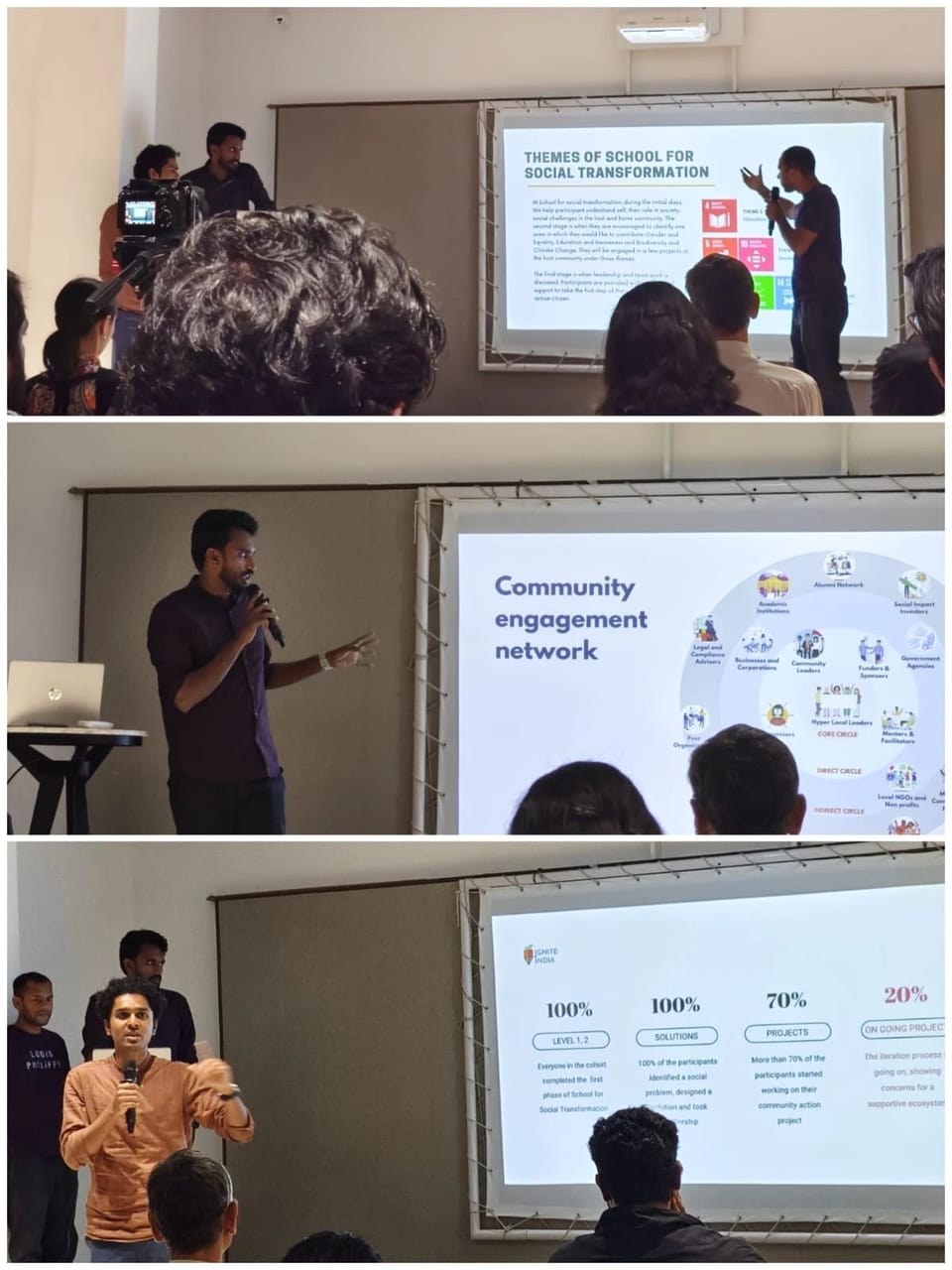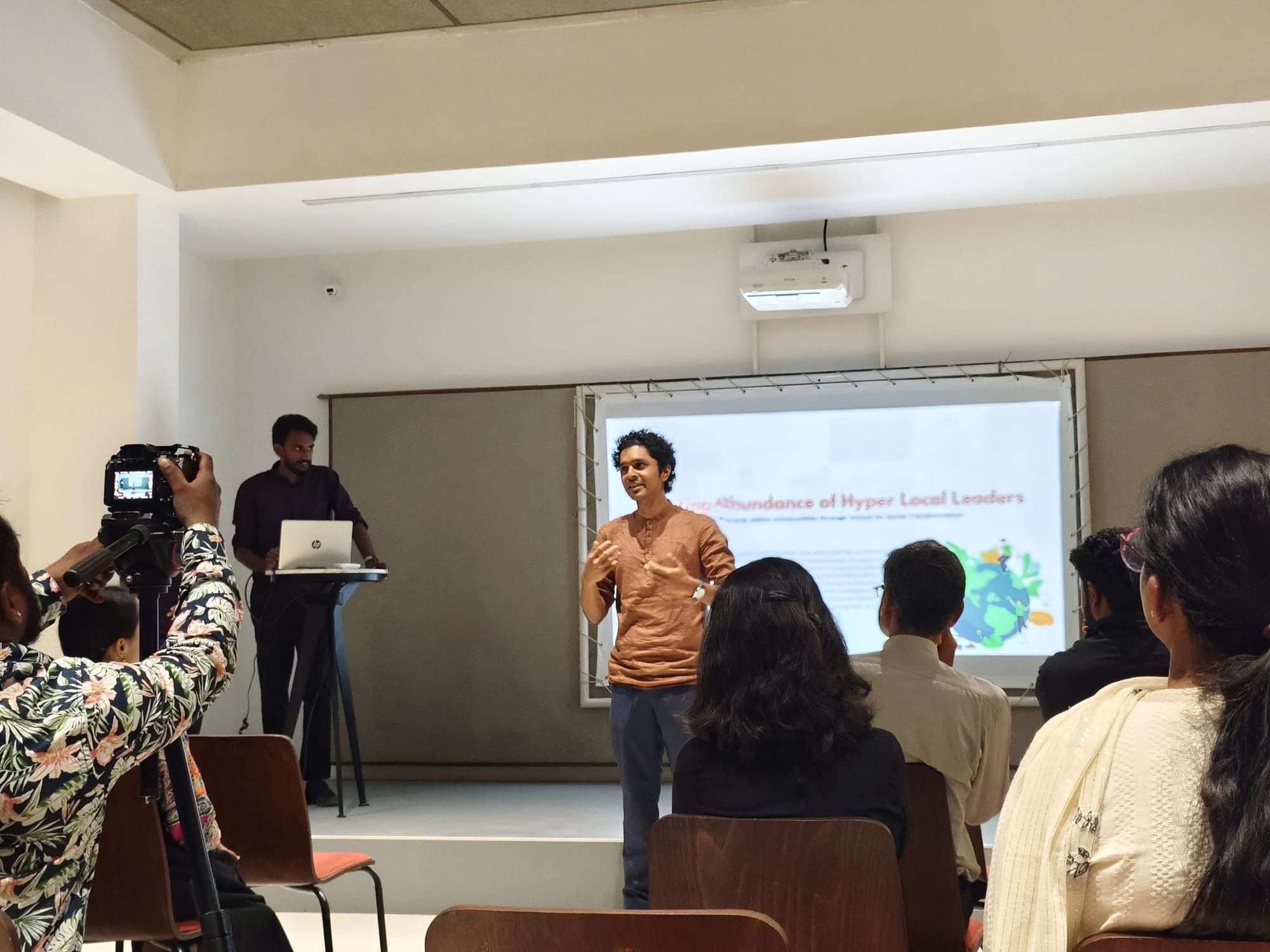Experiential Learning for Climate Education: The Ignite Foundation’s Impact at the Climate Education Summit 2025

In January 2025, The Ignite Foundation had the privilege of presenting its research paper, "Experiential Learning for Environmental Education: A Case Study on the School for Social Transformation," at the Climate Education Summit held at Bangalore International Center. This research represents a culmination of our efforts in climate education, experiential learning, and action-based social transformation.
Co-authored by Muhammed Jaseel C K, Naji Mahfood, and Ijas H, the paper examines how immersive and experiential learning methodologies equip young changemakers with climate leadership skills and practical tools to address environmental challenges.
This research is particularly significant because:
✅ It was co-authored by practitioners and changemakers, ensuring that the case study research credits those who implement and drive the interventions.
✅ The summit audience primarily consisted of practitioners rather than just researchers, creating an opportunity to share real-world impact and inspire replication.
Our Experiment with Experiential Learning for Climate Action
For the past few years, The Ignite Foundation has been experimenting with experiential learning models through initiatives like Khoj India, The Ignite Fellowship, and the School for Social Transformation (SST).
This is not just an educational model—it is action research, where we pose research questions and, through an iterative process, refine our approach to changemaker education.
How Do We Apply Experiential Learning?
We combine Design Thinking for Social Change with a Learning Management System (LMS), recently piloted under Vaaka Academy to make learning practical, dynamic, and community-driven.
This model integrates:
🔹 Real-world climate action projects—including beach cleanups, afforestation efforts, and sustainable tourism campaigns.
🔹 Community engagement methodologies—where participants design and execute local sustainability projects.
🔹 Leadership training through problem-solving and peer learning.
The Case Study: School for Social Transformation (SST) on Climate Action
The School for Social Transformation (SST) is a three-phase experiential leadership program designed to empower young people aged 18-35 to take climate action.
Since its inception, SST has conducted six editions across Kerala, Rajasthan, and Himachal Pradesh. The 5th and 6th editions were exclusively focused on climate education and sustainability.

Program Structure
1️⃣ Online Learning Phase (4-8 Weeks):
- Participants engage in theory-driven workshops on development, sustainability, and climate action.
- Reflective exercises and research help them identify key climate challenges.
2️⃣ Immersive Winter School (9 Days, Offline):
- Hosted in Kerala, this phase includes leadership development, community interaction, and project design.
- Activities include beach cleanups, responsible tourism campaigns, and eco-friendly innovations.
3️⃣ Community Action Projects (6 Months):
- Participants implement their climate projects in their home communities with mentorship and peer support.
- Includes sustainability projects like mangrove restoration, climate education in schools, and plastic-free campus initiatives.
Impact of the 6th Edition of SST
📌 900+ individuals engaged across the three phases.
📌 20 sacks of waste removed in the Varkala Beach Cleanup Drive.
📌 50 steel bottles distributed as part of the Bottles Up Challenge, making schools plastic-free zones.
📌 12 community-driven climate projects launched across Kerala.
Key Insights from Our Research at the Climate Education Summit
1️⃣ Experiential Learning Strengthens Climate Leadership
- Participants develop self-awareness, resilience, and changemaking skills by actively engaging in climate projects.
- SST fosters a culture of social innovation and entrepreneurship for sustainability.
2️⃣ Localized Climate Action Creates Greater Impact
- Community-driven solutions lead to long-term sustainability and wider adoption.
- Micro-level initiatives like plastic-free schools, afforestation, and climate advocacy show scalable results.
3️⃣ Challenges in Scaling Climate Education
- Ecosystem constraints limit the transition from small-scale action projects to climate-focused social enterprises.
- Sustained engagement during the six-month community phase requires ongoing mentorship and digital tools.
Next Steps: Scaling Impact through Partnerships & Innovation
To expand our climate education efforts, The Ignite Foundation is focusing on:
📍 Expanding Mentorship—Involving experts from climate tech, policy, and sustainable entrepreneurship.
📍 Certification Partnerships—Collaborating with academic institutions to add value to participants’ experience.
📍 Scalable Toolkits—Developing ready-to-use resources that help participants replicate climate projects in their communities.
📍 Digital Learning Platforms—Using LMS and digital tools to sustain engagement in the 6-month community action phase.
Conclusion: A Call for Collaborative Climate Action
The School for Social Transformation and its research on experiential learning highlight that climate education must go beyond classrooms. It must empower communities, equip changemakers, and create scalable solutions for climate resilience.
We are excited to take our research forward and collaborate with other practitioners, educators, and institutions to deepen climate education and experiential learning models.
If you are interested in partnering with us or learning more, feel free to connect!
🌍 #ExperientialLearning #ClimateEducation #ChangemakerLeadership #SocialImpact #SST2025 #VaakaAcademy
🔗 To read the full paper:
📄 Experiential Learning for Environmental Education: A Case Study on the School for Social Transformation
📧 For partnerships and collaborations: teamigniteindia@gmail.com
🚀 Let’s co-create a future where education transforms communities and drives sustainable change!